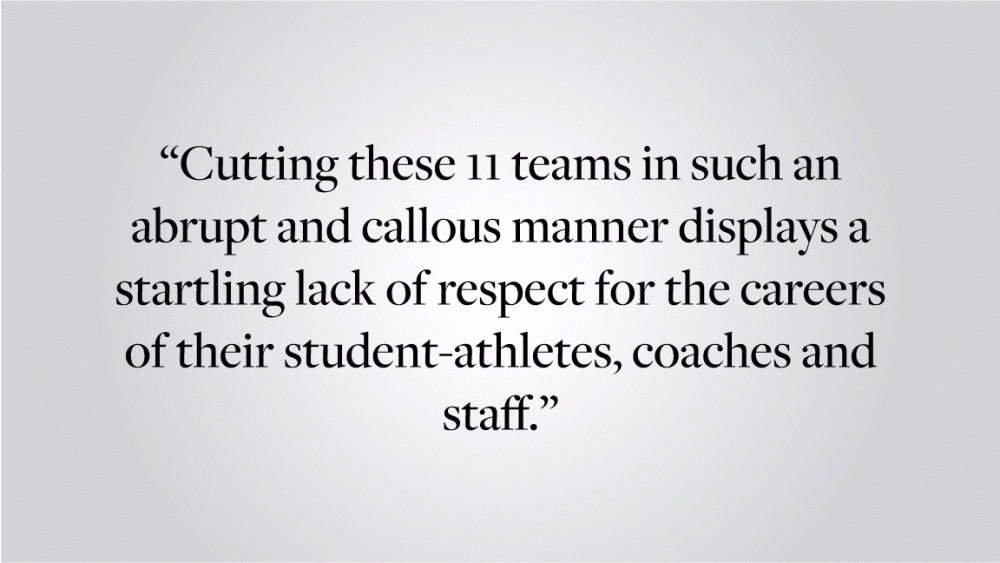As many may now know, on May 28 Brown University ended the athletic careers of 84 men and 65 women on a roughly six-minute Zoom call. The decision was swift, brutal and incontestable. By removing the varsity status of 11 sports teams without warning, Brown University has abandoned 149 students, including 35 new recruits — and with minimal support.
While many student-athletes have written in anguish about this decision — justifying why their team, in particular, ought to be preserved — we, the captains of eight of the teams cut, write today to clarify why this decision, no matter the team, was inherently unjust. In addition to its utter lack of respect for our athletic and academic achievements, the University’s decision shows a complete disregard for the futures of students whose careers are governed by NCAA guidelines and bound by personal circumstances.
In a follow-up call on May 29, the athletic department made clear that these student-athletes only had two options: transfer to another institution or continue their careers at the club level. Unfortunately for most athletes, the transfer deadline for comparable institutions, including those in the Ivy League conference, passed two months ago. Athletes can extend the transfer deadline until June 15, just eight days away, by getting recruited by a new coach. Unfortunately, at this point coaches have committed all their spots for the next one or two years to incoming student-athletes to guarantee the strength of the incoming freshman class. Any collegiate athlete unable to be recruited must now wait over a year before they can compete again. During this waiting period, students will not have access to the varsity weight room, the varsity training room or their sports’ own practice and competition spaces, all vital to the continued peak performance of elite athletes. What’s more, because many students have already started their collegiate careers, this wait will result in a wasted year of NCAA eligibility.
This did not need to be the case. Had the University announced its decision a year or two in advance of enacting the cuts, or even as late as December (as other universities have done in similar situations), current athletes would have had the possibility to apply to transfer, while recruited athletes could have withdrawn from the University or accepted offers from other universities.
Asking elite athletes, some of whom have the potential to become Olympians, to practice and compete at a club level demonstrates a deep misunderstanding of the crucial role collegiate athletics plays in their careers. Club athletics do not offer adequate practice or competition opportunities to allow a varsity athlete to remain at the top of their game. Besides a drastic decrease in support a club athlete receives compared to a varsity athlete, club athletes have significantly reduced opportunities for competition. Strong competitions are not simply a chance for athletes to demonstrate prowess – they also offer many athletes a unique opportunity to enact techniques or strategies, improve their mental toughness and most of all, practice the art of competition itself. For the athletes without existing club sports at Brown, this transition is even harder, as they need to form a competitive club without much university support, if any.
By announcing this decision during a pandemic, Brown University has stranded many student-athletes and coaches in difficult financial situations. Many students will not have the means to consider a transfer and incur the costs of delaying their education a year or relocating to another school. Just as many universities have finalized their student body for the coming year, so too have they filled any open coaching positions, leaving the coaches and staff for the 11 teams without jobs, health insurance and other benefits — at a time when this security is needed most.
Cutting these 11 teams in such an abrupt and callous manner displays a startling lack of respect for the careers of their student-athletes, coaches and staff. During this process, the University has continued to show either a complete disregard for the athletic community or an unrivaled level of incompetence. Neither bodes well for the future of athletics at Brown.
Nathan Sinai ’21 is the captain of men’s fencing and can be reached at nathan_sinai@brown.edu. Naomi Lee ’21 is an incoming co-captain of women’s golf and can be reached at naomi_lee1@brown.edu. Please send responses to this opinion to letters@browndailyherald.com and op-eds to opinions@browndailyherald.com.
Signed,
Nathan Sinai ’21 (Men’s Fencing)
Anna Susini ’22 (Women’s Fencing)
Naomi Lee ’21 (Women’s Golf)
Pinya Pipatjarasgit ‘22 (Women’s Golf)
Winabel McCabe ’21 (Women’s Golf)
Brittany Park ’21 (Women’s Golf)
Chuck Isgar ’21 (Men’s Golf)
Elena Newman ’22 (Women’s Equestrian)
Hannah Woolley ’21 (Women’s Equestrian)
Alexa Jacobs ’21 (Women’s Squash)
William Glaser ’21 (Men’s Squash)
Maddie McCarthy ’23 (Women’s Ski)

ADVERTISEMENT


